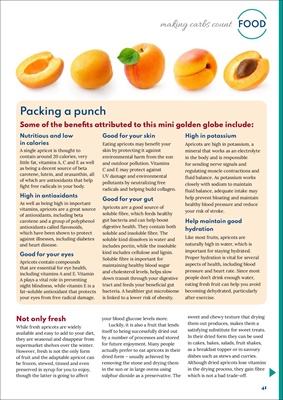
41
FOOD
making carbs count
Not only fresh
While fresh apricots are widely
available and easy to add to your diet,
they are seasonal and disappear from
supermarket shelves over the winter.
However, fresh is not the only form
of fruit and the adaptable apricot can
be frozen, stewed, tinned and even
preserved in syrup for you to enjoy,
though the latter is going to affect
Packing a punch
Some of the benefits attributed to this mini golden globe include:
Nutritious and low
in calories
A single apricot is thought to
contain around 20 calories, very
little fat, vitamins A, C and E as well
as being a decent source of beta
carotene, lutein, and zeaxanthin, all
of which are antioxidants that help
fight free radicals in your body.
High in antioxidants
As well as being high in important
vitamins, apricots are a great source
of antioxidants, including beta
carotene and a group of polyphenol
antioxidants called flavonoids,
which have been shown to protect
against illnesses, including diabetes
and heart disease.
Good for your eyes
Apricots contain compounds
that are essential for eye health,
including vitamins A and E. Vitamin
A plays a vital role in preventing
night blindness, while vitamin E is a
fat-soluble antioxidant that protects
your eyes from free radical damage.
Good for your skin
Eating apricots may benefit your
skin by protecting it against
environmental harm from the sun
and outdoor pollution. Vitamins
C and E may protect against
UV damage and environmental
pollutants by neutralizing free
radicals and helping build collagen.
Good for your gut
Apricots are a good source of
soluble fibre, which feeds healthy
gut bacteria and can help boost
digestive health. They contain both
soluble and insoluble fibre. The
soluble kind dissolves in water and
includes pectin, while the insoluble
kind includes cellulose and lignin.
Soluble fibre is important for
maintaining healthy blood sugar
and cholesterol levels, helps slow
down transit through your digestive
tract and feeds your beneficial gut
bacteria. A healthier gut microbiome
is linked to a lower risk of obesity.
High in potassium
Apricots are high in potassium, a
mineral that works as an electrolyte
in the body and is responsible
for sending nerve signals and
regulating muscle contractions and
fluid balance. As potassium works
closely with sodium to maintain
fluid balance, adequate intake may
help prevent bloating and maintain
healthy blood pressure and reduce
your risk of stroke.
Help maintain good
hydration
Like most fruits, apricots are
naturally high in water, which is
important for staying hydrated.
Proper hydration is vital for several
aspects of health, including blood
pressure and heart rate. Since most
people don't drink enough water,
eating fresh fruit can help you avoid
becoming dehydrated, particularly
after exercise.
your blood glucose levels more.
Luckily, it is also a fruit that lends
itself to being successfully dried out
by a number of processes and stored
for future enjoyment. Many people
actually prefer to eat apricots in their
dried form - usually achieved by
removing the stone and drying them
in the sun or in large ovens using
sulphur dioxide as a preservative. The
sweet and chewy texture that drying
them out produces, makes them a
satisfying substitute for sweet treats.
In their dried form they can be used
in cakes, bakes, salads, fruit shakes,
as a breakfast topper or in savoury
dishes such as stews and curries.
Although dried apricots lose vitamins
in the drying process, they gain fibre
which is not a bad trade-off.